It might surprise you, but up to half of all livestock losses come from poultry diseases. Knowing about chicken health is as important as giving them food and water. Diseases can quickly spread among chickens, whether in a small or large group. This can greatly harm your efforts and investments.
Biosecurity is more than just a buzzword; it’s your main guard against disease spread. To prevent outbreaks, it’s crucial to check your chickens regularly, know the symptoms, and separate sick ones quickly. This keeps not only your chickens safe but also gives you peace of mind. Wondering how to shield your chickens from illnesses like fowl pox and infectious bronchitis? Let’s explore some top ways to prevent and treat these diseases to ensure your chickens stay healthy.
Understanding the Spectrum of Common Diseases in Poultry
Keeping poultry healthy is a top priority. Knowing about avian diseases helps protect your flock. Let’s explore the sicknesses they face and how to spot trouble.
Types of Poultry Diseases: Viral, Bacterial, and Parasitic
Poultry can fall ill from viral, bacterial, or parasitic diseases. Each type harms chickens in its way and needs different care:
| Disease Type | Common Examples | Impact on Poultry | Prevention Measures |
|---|---|---|---|
| Viral | Avian Influenza, Marek’s Disease | Affects respiratory, nervous systems | Vaccination, biosecurity |
| Bacterial | Salmonellosis, Fowl Cholera | Irritates digestive system, septicemia | Sanitation, antibiotics |
| Parasitic | Coccidiosis, External parasites (mites, lice) | Intestinal damage, skin issues | Hygienic living conditions, antiparasitics |
Recognizing Signs of Behavioral Health Problems
Don’t ignore behavioral issues in poultry. Stress from poor care or diet can lead to aggression and other problems. Watch for odd behaviors and improve their environment or food as needed:
- Provide enough space to lower stress and fighting
- Add activities to prevent boredom and harmful acts
- Ensure their diet is complete to avoid deficiencies
Nutritional and Metabolic Issues in Chickens
Nutrient deficits can harm chickens as much as diseases. Missing vital nutrients may cause weak bones or poor eggs. Look out for signs like difficulty walking or fewer eggs:
- Feed a diet full of necessary vitamins and minerals
- Monitor how fast birds grow and the quality of their eggs
- Ask a nutrition expert for help if you suspect diet issues
Knowing about health risks and watching your birds closely is crucial for a successful poultry farm. The health and output of your flock rest on your readiness to prevent and address these challenges.
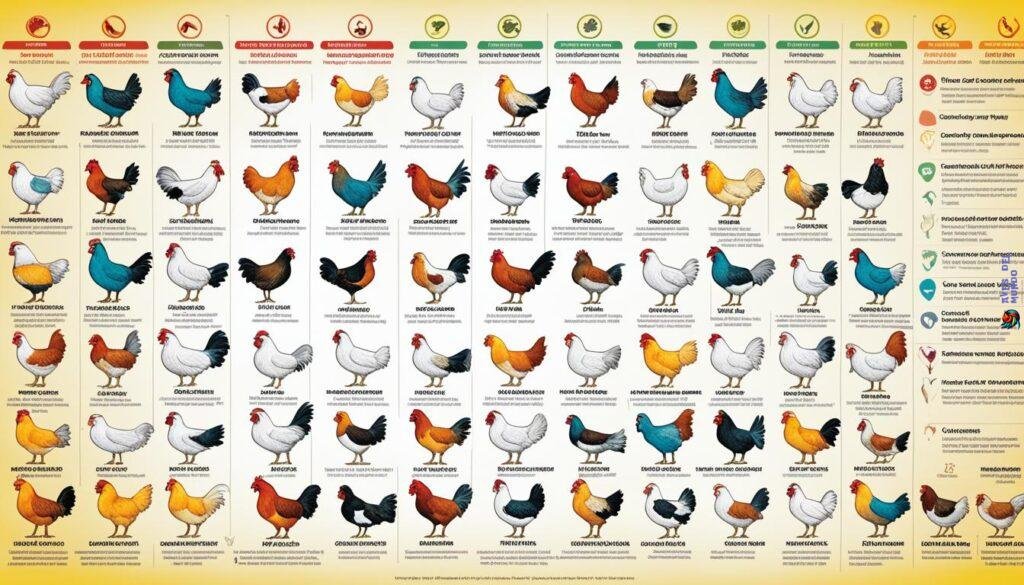
Importance of Biosecurity in Poultry Health Management
As a poultry owner, being vigilant in biosecurity protects your flock from many health issues. Strong biosecurity measures stop poultry diseases and keep your operation going. These practices are key in stopping contagious diseases from entering your flock.
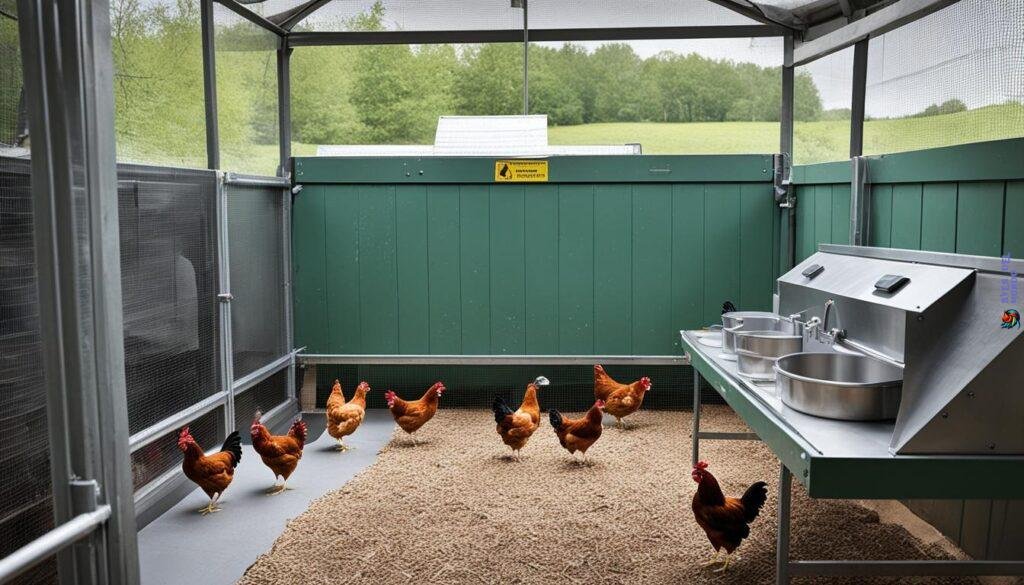
Implementing Effective Biosecurity Measures
Starting effective biosecurity means making a barrier to stop contamination sources from reaching your birds. This barrier includes checkpoints for people and things entering your farm. Below are important steps you should follow.
- Install disinfectant foot dips and vehicle sprays at farm entrances.
- Designate clothing and footwear for use only within the coop.
- Train personnel in proper hygiene protocols.
- Set up a system for monitoring flock health daily.
Controlling the Spread of Infectious Diseases
Quick action is crucial in stopping the spread of poultry diseases. Catching symptoms early can prevent an outbreak.
| Sign of Illness | Immediate Action | Long-Term Prevention |
|---|---|---|
| Respiratory distress | Quarantine and veterinary consultation | Regular vaccination and air quality control |
| Unusual mortality rates | Disease investigation and carcass disposal | Population management and stress reduction |
| Behavioral changes | Isolate affected birds and observe | Environmental enrichment and space management |
| Drop in production | Nutritional assessment and flock examination | Feed quality assurance and biosecurity reviews |
Following these biosecurity steps and having emergency plans in place will create a safe, productive space for your poultry. This way, you can avoid the bad impact of contagious poultry diseases.
Confronting Parasitic Challenges in Your Flock
Raising chickens means you must watch out for poultry diseases as much as you feed them. This is because your flock’s health is closely linked to its productivity. Among the many health issues, parasitic poultry diseases are a big worry. Pests like mites, lice, and roundworms cause stress and discomfort. They also lead to skin problems, damaged feathers, and other infections.
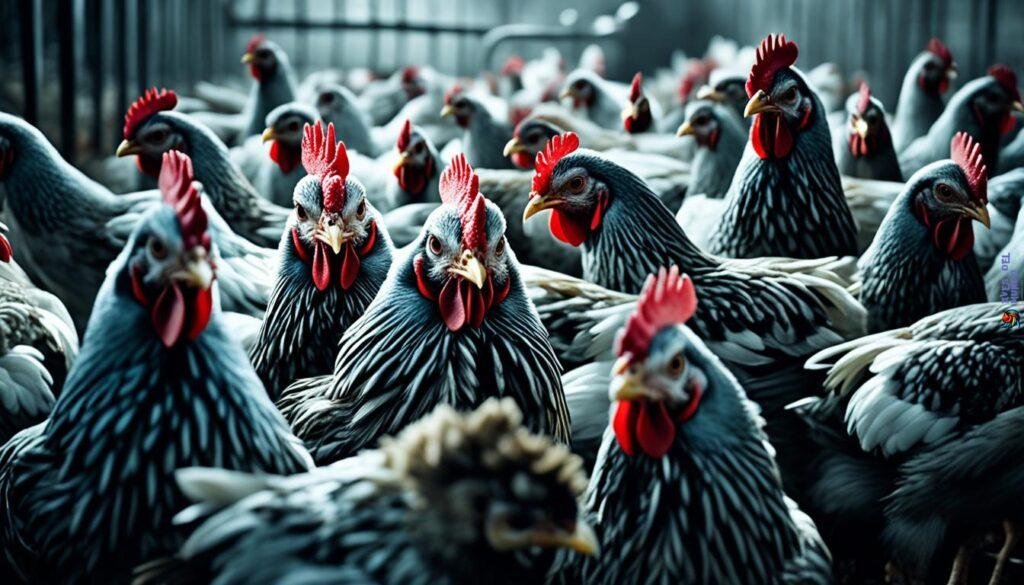
To keep your birds healthy, you must know about the avian diseases they face. Checking your chickens regularly and keeping their home clean are key first steps. You shouldn’t wait to see obvious problems. Staying ahead through regular checks is crucial for catching issues early on.
Remember, a clean coop isn’t just a matter of aesthetics—it’s an imperative for thwarting parasites and safeguarding the health of your flock.
Now, let’s look at some common enemies:
| Parasite | Common Signs | Impact on Flock | Control Measures |
|---|---|---|---|
| Mites | Feather pecking, scabs, nocturnal restlessness | Anemia, decreased egg production, potential transmission of other diseases | Regular cleaning, acaricides, promoting natural behaviors such as dust-bathing |
| Lice | Visible moving lice on skin, ragged feathers | Weight loss, decreased immunity, irritation | Checking new birds for lice, isolating infested poultry, insecticidal treatments |
| Roundworms | Weight loss, dulled feathers, visible worms in droppings | Nutrient malabsorption, intestinal blockages, stunted growth | Deworming programs, proper waste management, regular coop maintenance |
Fighting parasitic poultry diseases requires steady effort. Sticking to strict cleaning rules and using pest control helps fight avian diseases from parasites. By putting your flock’s health first, you can keep them happy and productive. Remember, preventing disease is always better than treating it.
Common diseases in poultry: Identification and Prevention
Being watchful is essential when you raise chickens. It helps in catching poultry sickness early on. Look out for signs like breathing issues, weird droppings, or tiredness. These are clues that your chickens might be getting sick. This includes common diseases in poultry. To stop these diseases, it’s important to keep things clean, limit contact with germs, and feed your chickens right.
To fight diseases in your chickens, it’s vital to know what you’re dealing with. Diseases like chicken infections called coccidiosis need clean environments to stop parasites. For diseases spread through the air like avian flu, you need strong safety measures. Below is a simple table that shows some common chicken diseases and how to prevent them:
| Disease | Symptoms | Prevention Strategies |
|---|---|---|
| Coccidiosis | Bloody stool, listlessness | Regular cleaning, use of medicated feed |
| Avian Influenza | Respiratory distress, decreased egg production | Biosecurity measures, vaccination where available |
| Marek’s Disease | Paralysis, weight loss | Vaccination, maintaining clean litter |
| Salmonella | Diarrhea, fever | Proper sanitation, pest control |
Watch your chickens closely for any signs of sickness. Using the right prevention can lower the chance of disease in your flock. Quick detection and action are key to stop these diseases from spreading. Always be on the lookout for new ways to keep your chickens safe and healthy.
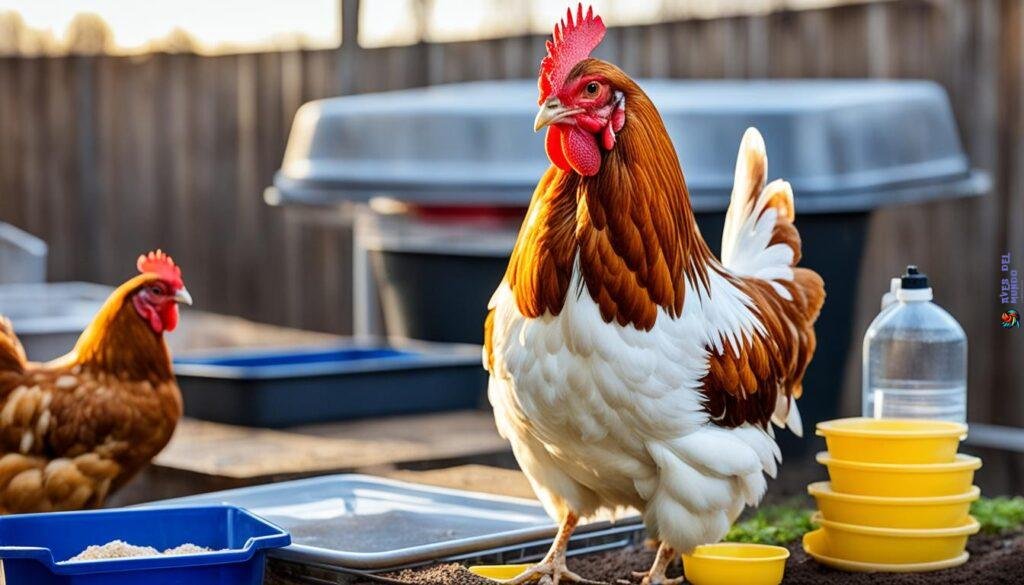
Vaccination: A Cornerstone in Preventing Poultry Diseases
Understanding the crucial role of poultry vaccination is key for poultry farmers. It acts as a proactive shield against poultry illness and avian diseases. These can be devastating to your flock. Alongside biosecurity, vaccinations add a vital defense layer for your chickens.
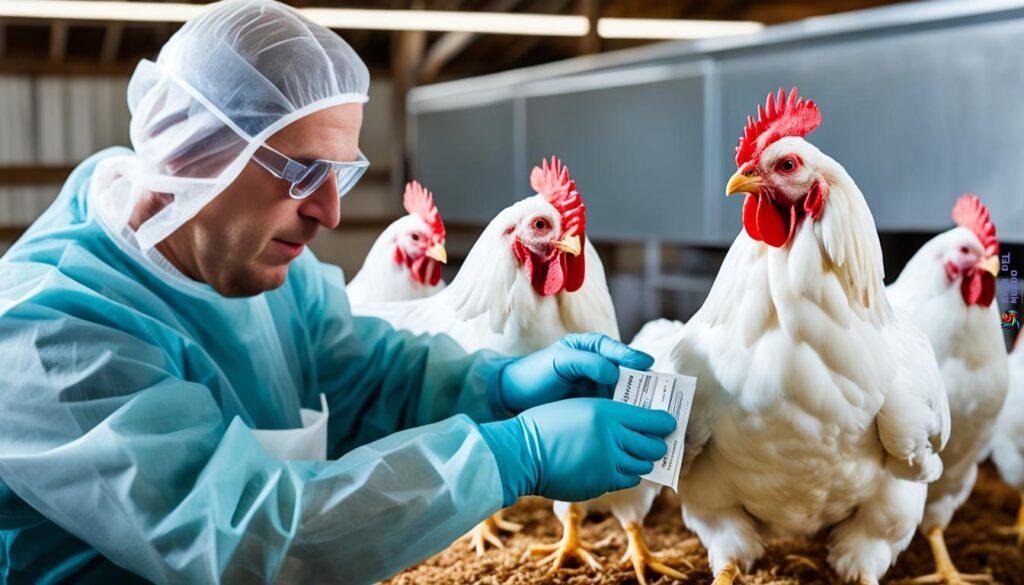
Vaccines must be given as per set schedules. The process starts with young chicks and goes on as they grow. This builds a strong immune system to fight diseases like fowl pox, infectious bronchitis, and Newcastle disease.
- Fowl Pox Vaccine: Often given to chicks at 1-day old as part of their initial immunization program.
- Infectious Bronchitis Vaccine: Usually administered via drinking water or spray to ensure easy access for the entire flock.
- Newcastle Disease Vaccine: Vital for safeguarding against this virulent virus, it’s commonly administered through eye drops or nasal spray.
Keeping an up-to-date poultry vaccination program is crucial to prevent avian diseases. It protects your poultry’s health and your farm’s productivity. Consult a vet to customize the best vaccination plan for your needs.
Investing in a full vaccination plan is crucial for your poultry’s long-term health. The risk of illness in an unvaccinated flock is high. Vaccination is not just smart—it’s essential for your chickens’ well-being and your business success.
Specific Disease Profiles: Fowl Pox
If you love raising chickens, it’s key to know about their diseases. Fowl pox is one such illness. It can hit chickens at any age and mess up the coop’s harmony.
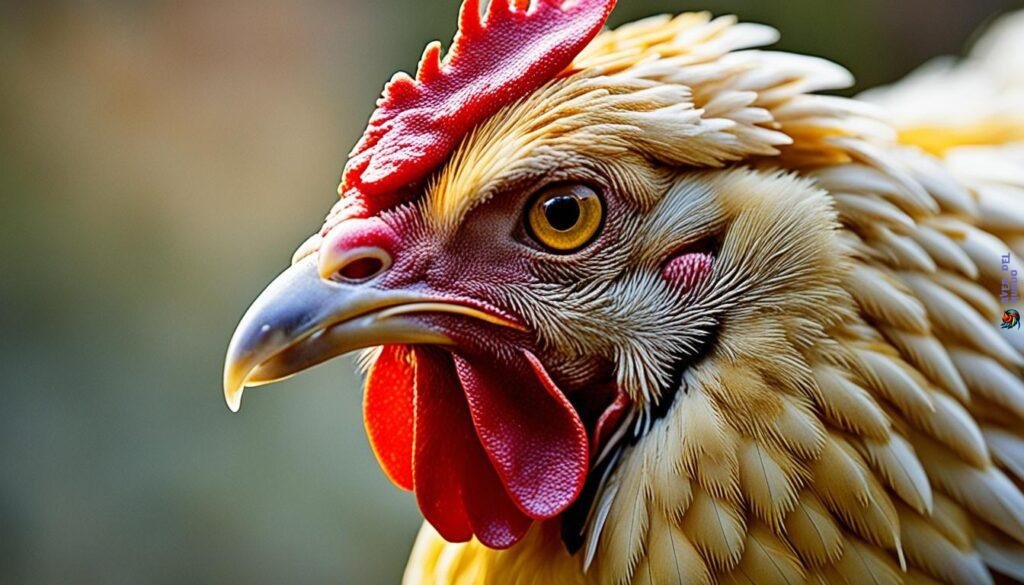
Symptoms and Diagnosis of Fowl Pox
Fowl pox shows up in two ways. The dry form has scab-like spots on parts without feathers, like legs and comb. The wet form causes sores in the mouth and trouble breathing, with mucus coming from eyes and beak. If you think a chicken has fowl pox, a vet should check these signs to be sure.
Treating and Mitigating Fowl Pox in Chickens
Once a chicken catches fowl pox, it can’t be cured. But, you can make it easier for them to get through it. Keep their living space clean and use antiseptic on the sores if needed. Preventing the disease is better. Vaccines help a lot in keeping chickens safe from fowl pox. Also, since mosquitoes spread it, keep them away from your birds. And if you notice a chicken is sick, keep it away from the rest to stop the spread.
Handling Respiratory Conditions Like Avian Bronchitis
Efficiently dealing with poultry health issues means spotting signs of respiratory conditions in poultry early. Diseases like avian bronchitis need early symptom recognition. This is crucial for keeping your flock healthy and productive.
Spotting the Early Signs of Bronchitis in Poultry
If your birds have trouble breathing, they might have avian diseases like bronchitis. Watch for these signs:
- Wheezing or labored breathing
- Nasal discharge
- Reduced egg-laying performance
- Decreased appetite and water consumption
Noticing these signs early is key to stop an epidemic from hitting your farm.
Strategies for Managing Bronchitis in Your Flock
There’s no cure for bronchitis, but you can keep your flock strong. Supportive care reduces stress on sick birds. This includes:
- Ensuring clean and well-ventilated housing
- Providing supplemental vitamins and electrolytes
- Isolating symptomatic birds to prevent spreading the disease
The table below shows how to manage respiratory conditions in poultry, especially avian bronchitis:
| Preventive Measure | Description | Impact |
|---|---|---|
| Vaccination | Administering vaccines to prevent avian bronchitis | Builds flock immunity, reducing outbreak severity |
| Biosecurity | Implementing strict protocols to prevent disease entry and spread | Minimizes risk of viral introduction and cross-contamination |
| Rodent Control | Regular measures to eliminate rodents from poultry houses | Prevents a common vector of disease from affecting the flock |
Robust biosecurity and proactive health management protect against respiratory conditions in poultry like avian bronchitis. By using these strategies, you can keep your birds healthy and productive. This is crucial for dealing with common poultry health issues.
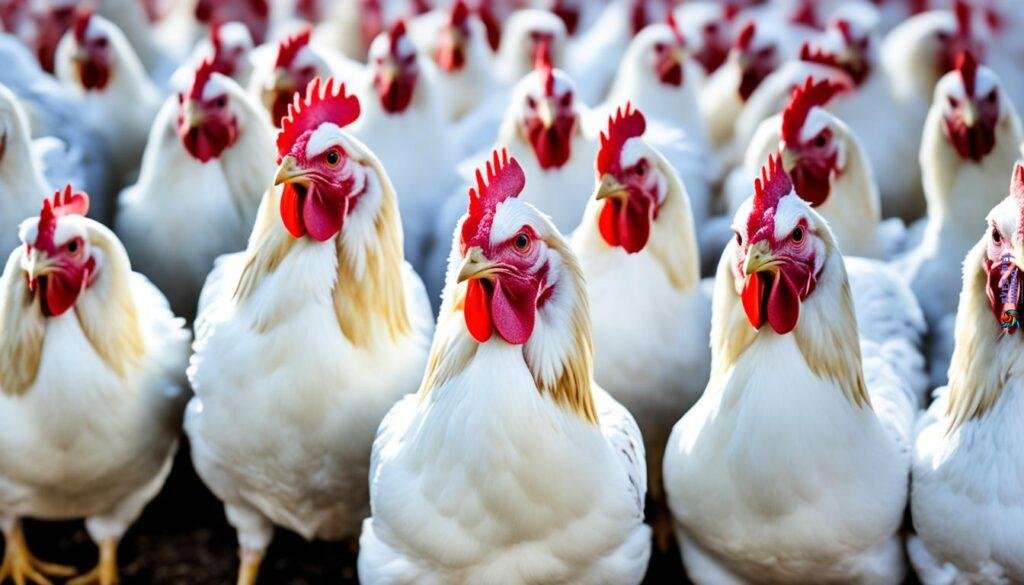
Addressing Marek’s Disease in Young Poultry
As a poultry owner, dealing with Marek’s disease in chickens is tough. This virus is a major cause of poultry sickness. It mainly affects young chickens, causing tumors, paralysis, and sometimes blindness. But, there are ways to protect your chickens from this dangerous avian disease.
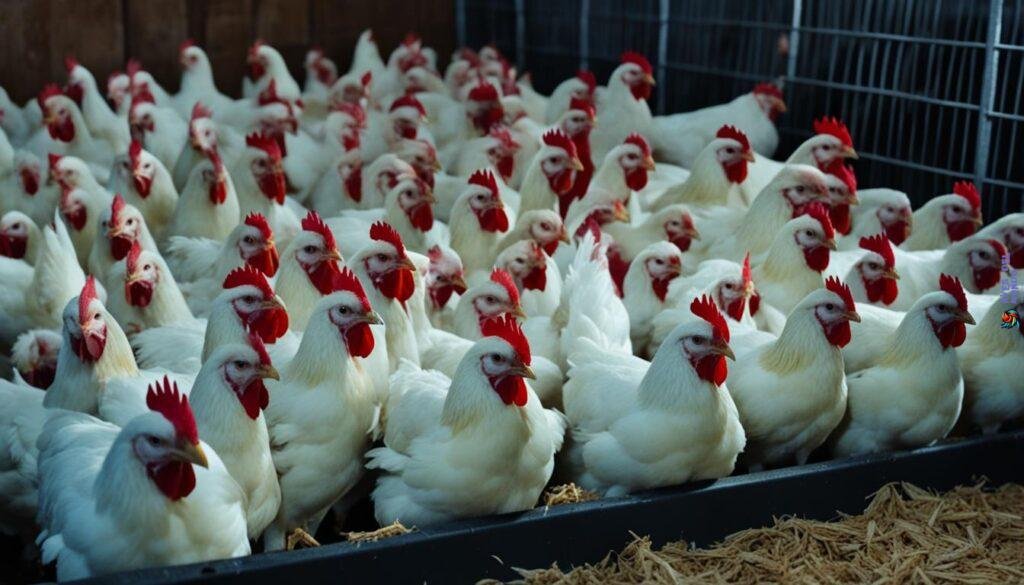
It’s important to know there’s no cure for Marek’s disease. So, prevention is key. The best way to prevent it is by vaccinating the birds while they’re chicks. This should be done before they come into contact with the virus. Keeping the coop clean is also critical. It helps stop the spread of feather dander that carries the virus.
| Preventative Measure | Description | Benefit |
|---|---|---|
| Vaccination | Administered at a young age to build immunity | Significantly reduces the risk of disease development |
| Cleanliness | Rigorous cleaning to remove potential virus carriers, such as feather dander | Prevents environmental spread of the virus |
| Isolation | Keeping new or sick birds separated from the flock | Minimizes risk of transmission to healthy individuals |
Fighting Marek’s disease in chickens is about biosecurity and healthcare. If you focus on these, you’ll stand strong against this and other avian diseases.
Combating Parasites: Coccidiosis in Chickens
In the world of poultry diseases, parasitic issues can hit hard. Coccidiosis in chickens stands out, needing quick action. It attacks the intestines, leading to serious problems like bloody stools, ruffled feathers, and loss of weight. Knowing how to tackle this disease is key to keeping chickens healthy.
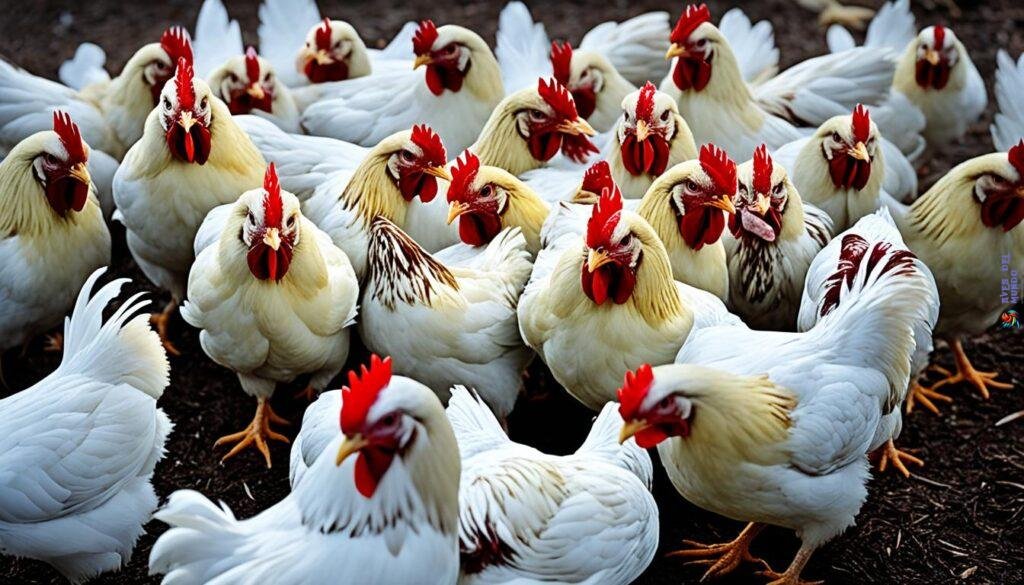
Treatment Strategies: Fighting coccidiosis starts with the right meds. Using antibiotics and anticoccidial drugs is the way to go. These can lower death rates and ease suffering for sick birds.
| Symptoms | Preventative Measures | Treatment Options |
|---|---|---|
| Bloody diarrhea | Maintain a dry and clean coop environment | Antibiotics (e.g., Amprolium) |
| Ruffled feathers | Proper sanitation practices | Anticoccidial medications |
| Weight loss | Medicated feed or probiotics | Dietary supplements |
Preventative Care: A clean coop is vital for stopping coccidiosis in chickens. Dry conditions make it tough for coccidia parasites to thrive. Clean regularly and manage water and food to avoid disease spread. Also, medicated feed or probiotics can keep chickens healthier.
Being aware and proactive against poultry diseases like coccidiosis is crucial. This way, your chickens stay healthy, ensuring top-quality poultry products.
Ensuring Poultry Well-Being through Hygiene and Care
Keeping chickens healthy means putting hygiene and care first. It’s crucial to clean their coop and equipment regularly. Doing so helps stop chicken infections from spreading. Making sure your chickens have fresh water, good food, and a clean place to sleep is essential. These steps are vital for preventing diseases and keeping your farm safe.
But it’s not just about keeping their environment clean. If a chicken starts to get sick, you need to act fast. Treating sick chickens quickly helps stop poultry illness prevention. Also, washing your hands after handling them reduces disease spread. Keeping sick chickens away from the healthy ones can protect the whole flock.
Good care is about more than just the basics; it boosts your chickens’ health and productivity. Following these care guidelines ensures your poultry farming is successful. Healthy chickens mean a more successful farm. So, investing in their well-being through good hygiene and care helps your farm thrive in the long run.



